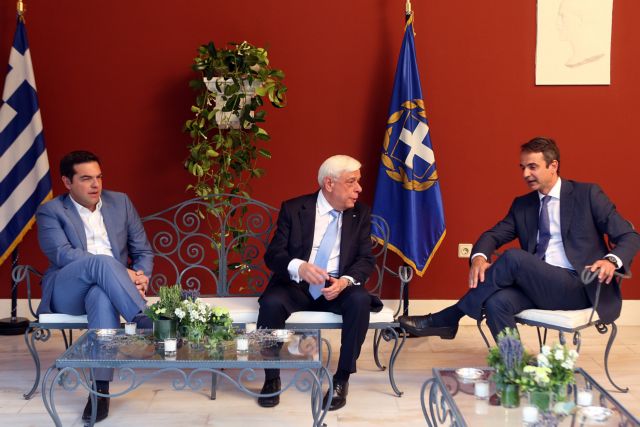Anyone who has the opportunity to speak candidly with senior government officials, aside from the formalities demanded by the roles and positions, can sense the agony and occasionally the awkwardness over the actions of the leftist government. There are distinguished divs, with decades of experience in politics, who admit that SYRIZA and the Left as a whole were surprised by the crisis and its intensity. “There were no provisions, you will not find a single document – no matter how hard you look – for policies to address and manage a crisis as cataclysmic as the one we have experienced in the past few years” tells us one of the most senior party officers, who has been managing the country’s future since January 2015.
The same officer sincerely added that “it is true that we had other things in mind that what we were forced to do”. “Of course we never thought of [leading] the country outside of the Eurozone, there may have been tactics, but there never was such a choice of monumental importance” he categorically stated, in anticipation of such a question, as well as to prevent any negative assumptions that such admissions may cause.
However, when justifiably asked “and now what”, he responds the same sincerity: “What every smart person can understand, we are now buying time, making concessions, ideological and otherwise”.
This is perhaps the essence of the current political period. In its effort to address the complexity of the economic, social, domestic and international circumstances, the Alexis Tsipras government is trying to buy time by making concessions to potential allies, in order to create alliances capable of maintaining the current government of changing ideas and beliefs in power.
“They are 40 years old, they don’t know”
It is true that most of the government officers were trained as an assertive opposition, they had no experience in government and some will even admit that they ignored correlations in Europe, had no idea of the principles and rules of the Eurosystem, as well as the commitments that stem from its membership. Furthermore, they were deluded and had developed arbitrary notions on how a country is governed. The younger ones, including the leader, were also not aware of the historicity or the quality of divs. “They are only 40 years old, they do not know, they hear and see someone well-dressed and well-mannered, thinking they are respectable citizens; they do not know what they are after, what their intent and how well-meaning they may be” our interlocutor clarifies, to address any misunderstandings.
However the explanation does not convince the skeptics, who see the Prime Minister’s team constantly planning and attaining almost a scientific quality in its propaganda as it is in creating spectacles, for political and public relations purposes.
The conception and execution of the plan for the conquest of the media, despites its misfires, illustrates – if anything – the extremism and intentions of the team behind the strategic planning. Mr. Pappas may have been exposed by the quality of the new candidates for a television license, but the plan to take over the media, opportunitistically, is politically effective for now
Mr. Tsipras governs by cultivating the contrast with the media and through it he aims to rearrange the country’s economic forces.
It is obvious that his appeal to an enemy within is not enough. If there is no progress and no new wealth being generated, even the best of plans will fail. We are likely close to the point of failure, despite what the government may optimistically claim. The economy is becoming increasingly “darker”, as evident by the revenue shortfall in July.
If the tax burden causes a refusal to pay the increasing taxes and tax evasion proliferates, then the whole effort will result in failure, dragging everyone along, first and foremost the most ambitious of the new Left.
This is where the conspiracy theories begin, which have found fertile ground in our country. The latest ones being circulated in the capital sound impressive, they start from the distant past and by historic coincidence, they are now coming to solve our problematic present.
The clash over telecommunications
The current conspiracy theories suggest that everything began in the mid-80s, during the time of Andreas Papandreou, when the major issue of the modernization of the country’s telecommunications emerged.
At the time the state-owned OTE ruled communications. Its offered services were bad, the request for new telephone lines unfulfilled. The popular demand for a modernization was crucial for economic growth. During that phase two dominant interest groups clashed, which have accompanied us and determined the country’s path ever since, according to the conspiracy theorists.
The first group was lead by the emergent at the time Socrates Kokkalis, son of Petros Kokkalis, a legendary div of the Left, who was appreciated by the bourgeoisie in Athens.
A pioneering neurosurgeon during the interwar period, Petros Kokkalis fled to the mountains during the German Occupation and later joined the Democratic Army of Greece and later followed the defeated communists in Eastern Europe. He was one of the few who received academic tenure in East Germany. His son, Socrates, grew up there, studied in Moscow and at some point in the 1960s he repatriated in order to try his luck in business. All doors are open for the son of Petros and many more will open with Andreas Papandreou; more so when he attempts to become the main supplier of OTE and to lead the modernization effort. Socrates Kokkalis represented East German interests, but he found ways to create a bizarre partnership with the West German, at the time, Siemens.
Vardis Vardinogiannis VS Socrates Kokkalis
On the other side was Vardis Vardinogiannis, an experienced Navy officer who resisted the dictatorship and owned a refinery and a decent fleet of tankers, was trying to get involved in telecommunications, the business of the future as many said at the time. He represents the Alcatel French interests and will struggle to participate in the commission of telecommunication equipment to OTE.
The clash between Kokkalis and Vardinogiannis will be fierce, or monumental proportions and will put the governments of Andreas Papandreou and that of Konstantinos Mitsotakis that was would follow, in a difficult position. The sides in that conflict will cause fragmentation in the political system. Horizontal political support groups, which transcend all parties, will emerge from both sides.
Due to his political heritage, Kokkalis will primarily find support in PASOK and the Left, while Vardinogiannis mostly in the Center Right, however, as mentioned before, the penetration in parties was horizontal. At some point the scales were tipped in Kokkalis’ favor, who became the dominant supplier for OTE.
The conflict, however, having become profoundly intense, will remain active over time. Some believe that the clash over vested interests emerged from that major conflict. When Mitsotakis was in power, when the term ‘vested interests’ was popularized, the conflict was becoming permanent, since he played with both sides. That is why his references were vague and the responsibilities for his fall were never personified, but rather he focused on accusing politicians, primarily Antonis Samaras.
Eclectic relations and competition
The conflict was later transported to the pitches, where the influence and sympathies were apparent. Over time the influence of Kokkalis in OTE diminished and after privatization it nearly vanished. At some point Kokkalis left telecommunications and turned to gambling on an international level and ultimately the political influence died out.
On the contrary, the influence of the Vardinogiannis family in politics grew huge. Everyone knows that these days the Vardinogiannis family has eclectic relations with the Prime Minister, President and Minister of National Defense, while being in touch with the Karamanlis family, as well as they leaderships of PASOK, the River and the Union of Centrists. They always had a competitive relationship with the Mitsotakis family due to Siemens, but nobody can be certain.
The banks and the role of foreigners
The current conspiracy theory wants the Vardinogiannis family to be under pressure and targeted by the country’s European partners. According to one version the family is the section of the Greek elite that is blocking the reforms. It is even said that the president of the European Commission Jean-Claude Juncker has expressed such opinions in Athens, on a political and financial level.
The troika had also exerted similar pressure in the past. According to the current conspiracy theory, in the current phase, the dominant interests will address the threat and secure political protection. The more imaginative ones will associate the constitutional review proposals, the attacks against Stournaras, the common attack of SYRIZA and the Karamanlis faction against the former chief of the Hellenic Statistics Authority Georgiou and imagine the two sides coordinating in order to cause a rift within New Democracy and half Kyriakos Mitsotakis’ rise to power. This scenario claims that Kyriakos Mitsotakis will fully surrender the country to the creditors, who will take everything and harm dominant interests.
Partnership against Mitsotakis
The conspiracy theory wants coordination, or rather better a partnership, between SYRIZA and the Karamanlis faction to isolate Mitsotakis to support and enhance the SYRIZA government, so as to maintain a degree of freedom from the foreigners and to avoid the imminent dehellenization of banks, businesses and everything of value. According to the current conspiracy theory though, the aforementioned is not enough.
Securing the Greek character requires other moves. Within this framework we have the cooperation between Panos Kammenos and Apostolos Tzitzikostsas – which is another blow against Kyriakos Mitsotakis – and formation of a youth party from a popular singer, modeled after the youthful Star Channel, in order to ensure that a section of the youth will not follow Mitsotakis and thus defending the Greek character.
Conspiracy theories have many believers in Greece and fertile ground to grow. Let us hope that the doctrine of buying time and making concessions is not linked to the success of such scenarios, but rather only the difficulties in governing and the need for the country to finally navigate its way out of the crisis. This is what is only truly needed.
SCENARIOS
In its effort to address the complexity of the economic, social, domestic and international circumstances, the Alexis Tsipras government is trying to buy time by making concessions to potential allies, in order to create alliances capable of maintaining the current government of changing ideas and beliefs in power.
Everyone knows that these days the Vardinogiannis family has eclectic relations with the Prime Minister, President and Minister of National Defense, while being in touch with the Karamanlis family, as well as they leaderships of PASOK, the River and the Union of Centrists.
The more imaginative ones will associate the constitutional review proposals, the attacks against Stournaras, the common attack of SYRIZA and the Karamanlis faction against the former chief of the Hellenic Statistics Authority Georgiou and imagine the two sides coordinating in order to cause a rift within New Democracy and half Kyriakos Mitsotakis’ rise to power.
Antonis Karakousis
Originally published in the Sunday print edition





